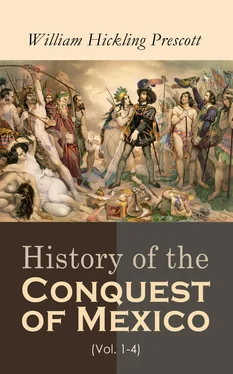The youthful cavalier, however, hesitated whether to seek his fortunes under that victorious chief, or in the New World, where gold as well as glory was to be won, and where the very dangers had a mystery and romance in them inexpressibly fascinating to a youthful fancy. It was in this direction, accordingly, that the hot spirits of that day found a vent, especially from that part of the country where Cortés lived, the neighborhood of Seville and Cadiz, the focus of nautical enterprise. He decided on this latter course, and an opportunity offered in the splendid armament fitted out under Don Nicolas de Ovando, successor to Columbus. An unlucky accident defeated the purpose of Cortés. [490]
As he was scaling a high wall, one night, which gave him access to the apartment of a lady with whom he was engaged in an intrigue, the stones gave way, and he was thrown down with much violence and buried under the ruins. A severe contusion, though attended with no other serious consequences, confined him to his bed till after the departure of the fleet. [491]
Two years longer he remained at home, profiting little, as it would seem, from the lesson he had received. At length he availed himself of another opportunity presented by the departure of a small squadron of vessels bound to the Indian islands. He was nineteen years of age when he bade adieu to his native shores in 1504,—the same year in which Spain lost the best and greatest in her long line of princes, Isabella the Catholic.
The vessel in which Cortés sailed was commanded by one Alonso Quintero. The fleet touched at the Canaries, as was common in the outward passage. While the other vessels were detained there taking in supplies, Quintero secretly stole out by night from the islands, with the design of reaching Hispaniola and securing the market before the arrival of his companions. A furious storm which he encountered, however, dismasted his ship, and he was obliged to return to port and refit. The convoy consented to wait for their unworthy partner, and after a short detention they all sailed in company again. But the faithless Quintero, as they drew near the islands, availed himself once more of the darkness of the night, to leave the squadron with the same purpose as before. Unluckily for him, he met with a succession of heavy gales and head-winds, which drove him from his course, and he wholly lost his reckoning. For many days the vessel was tossed about, and all on board were filled with apprehensions, and no little indignation against the author of their calamities. At length they were cheered one morning with the sight of a white dove, which, wearied by its flight, lighted on the topmast. The biographers of Cortés speak of it as a miracle. [492]Fortunately it was no miracle, but a very natural occurrence, showing incontestably that they were near land. In a short time, by taking the direction of the bird’s flight, they reached the island of Hispaniola; and, on coming into port, the worthy master had the satisfaction to find his companions arrived before him, and their cargoes already sold. [493]
Immediately on landing, Cortés repaired to the house of the governor, to whom he had been personally known in Spain. Ovando was absent on an expedition into the interior, but the young man was kindly received by the secretary, who assured him there would be no doubt of his obtaining a liberal grant of land to settle on. “But I came to get gold,” replied Cortés, “not to till the soil, like a peasant.”
On the governor’s return, Cortés consented to give up his roving thoughts, at least for a time, as the other labored to convince him that he would be more likely to realize his wishes from the slow, indeed, but sure, returns of husbandry, where the soil and the laborers were a free gift to the planter, than by taking his chance in the lottery of adventure, in which there were so many blanks to a prize. He accordingly received a grant of land, with a repartimiento of Indians, and was appointed notary of the town or settlement of Açua. His graver pursuits, however, did not prevent his indulgence of the amorous propensities which belong to the sunny clime where he was born; and this frequently involved him in affairs of honor, from which, though an expert swordsman, he carried away scars that accompanied him to his grave. [494]He occasionally, moreover, found the means of breaking up the monotony of his way of life by engaging in the military expeditions which, under the command of Ovando’s lieutenant, Diego Velasquez, were employed to suppress the insurrections of the natives. In this school the young adventurer first studied the wild tactics of Indian warfare; he became familiar with toil and danger, and with those deeds of cruelty which have too often, alas! stained the bright scutcheons of the Castilian chivalry in the New World. He was only prevented by illness—a most fortunate one, on this occasion—from embarking in Nicuessa’s expedition, which furnished a tale of woe not often matched in the annals of Spanish discovery. Providence reserved him for higher ends.
At length, in 1511, when Velasquez undertook the conquest of Cuba, Cortés willingly abandoned his quiet life for the stirring scenes there opened, and took part in the expedition. He displayed, throughout the invasion, an activity and courage that won him the approbation of the commander; while his free and cordial manners, his good humor and lively sallies of wit, made him the favorite of the soldiers. “He gave little evidence,” says a contemporary, “of the great qualities which he afterwards showed.” It is probable these qualities were not known to himself; while to a common observer his careless manners and jocund repartees might well seem incompatible with anything serious or profound; as the real depth of the current is not suspected under the light play and sunny sparkling of the surface. [495]
After the reduction of the island, Cortés seems to have been held in great favor by Velasquez, now appointed its governor. According to Las Casas, he was made one of his secretaries. [496]He still retained the same fondness for gallantry, for which his handsome person afforded obvious advantages, but which had more than once brought him into trouble in earlier life. Among the families who had taken up their residence in Cuba was one of the name of Xuarez, from Granada in Old Spain. It consisted of a brother, and four sisters remarkable for their beauty. With one of them, named Catalina, the susceptible heart of the young soldier became enamored. [497]How far the intimacy was carried is not quite certain. But it appears he gave his promise to marry her,—a promise which, when the time came, and reason, it may be, had got the better of passion, he showed no alacrity in keeping. He resisted, indeed, all remonstrances to this effect, from the lady’s family, backed by the governor, and somewhat sharpened, no doubt, in the latter by the particular interest he took in one of the fair sisters, who is said not to have repaid it with ingratitude.
Whether the rebuke of Velasquez or some other cause of disgust rankled in the breast of Cortés, he now became cold towards his patron, and connected himself with a disaffected party tolerably numerous in the island. They were in the habit of meeting at his house and brooding over their causes of discontent, chiefly founded, it would appear, on what they conceived an ill requital of their services in the distribution of lands and offices. It may well be imagined that it could have been no easy task for the ruler of one of these colonies, however discreet and well intentioned, to satisfy the indefinite cravings of speculators and adventurers, who swarmed, like so many famished harpies, in the track of discovery in the New World. [498]
The malecontents determined to lay their grievances before the higher authorities in Hispaniola, from whom Velasquez had received his commission. The voyage was one of some hazard, as it was to be made in an open boat, across an arm of the sea eighteen leagues wide; and they fixed on Cortés, with whose fearless spirit they were well acquainted, as the fittest man to undertake it. The conspiracy got wind, and came to the governor’s ears before the departure of the envoy, whom he instantly caused to be seized, loaded with fetters, and placed in strict confinement. It is even said he would have hung him, but for the interposition of his friends. [499]The fact is not incredible. The governors of these little territories, having entire control over the fortunes of their subjects, enjoyed an authority far more despotic than that of the sovereign himself. They were generally men of rank and personal consideration; their distance from the mother-country withdrew their conduct from searching scrutiny, and, when that did occur, they usually had interest and means of corruption at command sufficient to shield them from punishment. The Spanish colonial history, in its earlier stages, affords striking instances of the extraordinary assumption and abuse of powers by these petty potentates; and the sad fate of Vasquez Nuñez de Balboa, the illustrious discoverer of the Pacific, though the most signal, is by no means a solitary example, that the greatest services could be requited by persecution and an ignominious death.
Читать дальше












